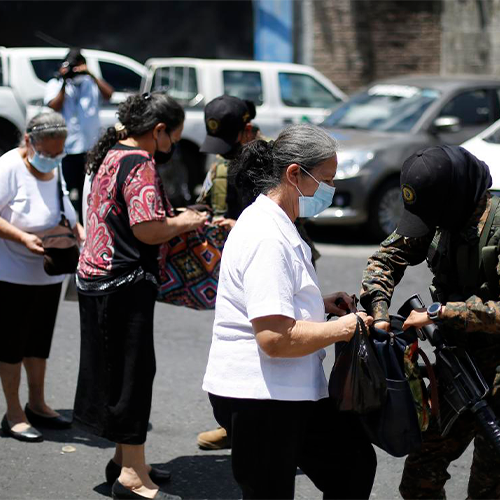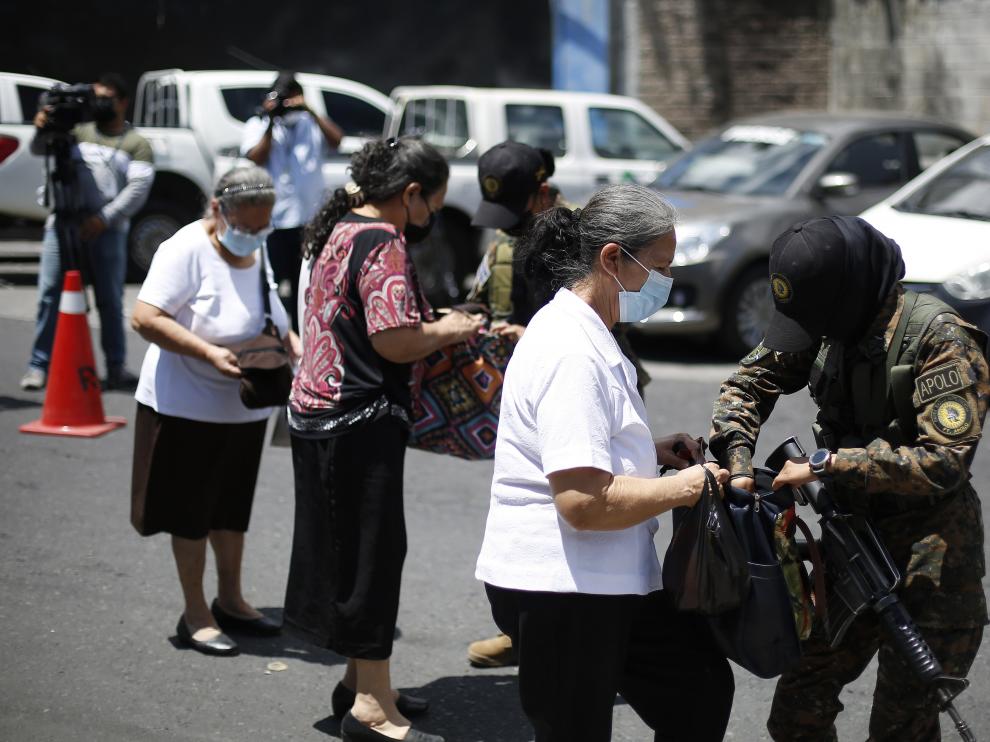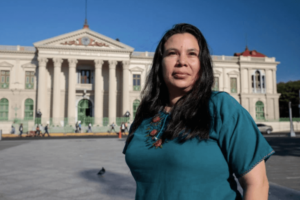
Context of Declaration of a State of Exception in El Salvador
by alejandra sandoval
On Saturday evening March 26th, President Nayib Bukele tweeted his request that the legislative assembly declare a state of exception in response to the horrific number of murders over the weekend. Early Sunday morning, the legislature, controlled by Bukele’s Nuevas Ideas party declared the state of exception suspending constitutional guarantees of freedom of assembly and altering basic guarantees related to arrest and detention. These measures, which are valid for 30 days, also permit the government to intercept communications, a concern to journalists and human rights defenders some of whom have already had their phones intercepted with the Pegasus program. Cristosal’s legal team is completely an initial analysis of the decree which will serve as the basis for any legal action that would be taken. Any time fundamental rights are suspended, it is imperative that strict oversight and transparency be maintained to prevent abuse of power.
What is a State of Exception? Simply put a state of exception is the use of a legal mechanism within the constitution of a country, which can be used by the head of state in the event or conflict that disturbs the internal order of that nation in order to be able to deal with it in an adequate manner. When a state of exception is established in an area of the country, the fundamental rights of the citizens residing in that area are automatically partially or totally suspended.

Bukele’s administration was the first since the Peace Accords to use the suspension of rights to address a national emergency. This was done at the beginning of the pandemic before there was community spread in El Salvador. Cristosal documented the ways in which the state of exception was used to abuse authority and control the population through fear. We presented legal cases which demonstrated the unconstitutional nature of those measures and have been a target of Bukele’s derision ever since.
The perpetrators of the violence are presumed to be gang-related, this has raised the question about the state of the as yet unclarified negotiations between the Bukele administration and El Salvador’s notorious gangs. The US Treasury Department of December 2021 gave details of a study documenting the corruption and participants in these negotiations. According to the study the Bukele administration had offered money to the gang “to ensure that incidents of gang violence and the number of confirmed homicides remained low,” the Treasury statement said. “Over the course of these negotiations with Luna and Marroquin, gang leadership also agreed to provide political support to the Nuevas Ideas political party in upcoming elections.”
Bukele has been adamant in his denial of negotiation with the gangs. He has touted the success of his “Territorial Control Plan” in which he has repeatedly claimed that his security policies have reduced the homicide rate to the lowest in decades. There has been little explanation as to why the policies suddenly became ineffective with the resulting bloodshed this past weekend. Cristosal has expressed concern that with no transparency as to criminal policy, all evidence points to a breakdown in what investigative journalists and the US Treasure Department have documented as an illicit negotiation.
The revelations from the Treasury Department contributed to the tensions between Bukele and Biden administrations. In May, in the opening session of the legislative assembly the Nuevas Ideas controlled congress removed the attorney general and the justices of the constitutional chamber of the Supreme Court. The U.S. government expressed serious concern about the agenda of the Bukele administration. Cristosal at that time worked diligently to take legal action as well as inform the public about the authoritarian direction of the administration.
The U.S. Agency for International Development announced it would shift aid from government agencies in El Salvador to non-governmental organizations, in part because of concerns of corruption. El Salvador’s new attorney general in June announced the government was canceling the Organization of American States’ anti-corruption mission in the Central American country. The social organizations who continue to take a stand of anti-corruption have been targeted for public criticism as well as an attempt to pass a law placing untenable tax burdens on their operations, among other deterrents.
Along with the state of exception declared by the legislature, the President also ordered (via social media) a complete lockdown in the prison system and sent a message saying this was punishment for the actions of their “homeboys” in the streets. His social messages included one to the “international community” concerned about “their angels” saying they are free to come bring food because he would not be spending any more money to feed terrorists and the current rations will have to be shared amongst them. The Vice President of Security and head of the Salvador prison system, Osiris Luna tweeted that with the state of exception gang members might not even make it to prison. Using the hashtag “WarAgainstGangs” (#GuerraContraPandillas) the focus of social media tweets from Bukele have focused on imprisoned gang members and the ways he plans to make them pay.
The Salvadoran population has long paid the price of ineffectual security policy. The rhetoric of vengeance and promises to eliminate the cause have played on the vulnerability of victims and communities who have no other recourse. His popularity
Bukele enjoys extremely high popularity. He stepped into a political vacuum left by discredited traditional parties from the left and right.
What Cristosal Is Doing
Our legal team have worked hard to produce a document outlining our legal analysis of the decree. We will send the analysis to diplomatic missions, international bodies, and media. The communications team will adapt the analysis in popular art format to be shared publicly. We will continue to combat the idea that the only way to protect lives is to sacrifice fundamental freedoms and invite Salvadorans to be aware of their own rights and seek recourse when they are violated. We use advertising to promote the protection system with a message of support to victims of violence and reopen the our digital platform to receive reports of human rights violations.
A Reflection from a Human Rights Defender

My Words are not for Those Who Wield Power
Rosa Anaya
No, my words are not for those who wield power, for that they would have to want to read and have the ears to hear, but right now they are very busy taking a photo of themselves, smiling and proud of the decree they requested and served in record time, as the last move on the chessboard of power: the pawns are dead, the king advances.
My words, my energies, my heart are for the families who this morning are taking care of the business of funerals for loved ones they did not say goodbye to properly, because they never thought that, in the country of virtual wonders, they would have to feel in flesh and heart, the way reality is sown in the cemetery, in a funeral of national import. This day I have cried for families I do not know, but for whom I feel and share the collective pain of this senselessness.
There are never words to give condolence, especially under these strange circumstances, I just want to say to those families I do not know, how sorry I am.
I also have my words for those who orchestrated the pulling of triggers: What did you gain? What did you lose? What was taken from you? What are you proud of the day after? You are part of this people; our people have already suffered too much to continue lending ourselves to the little game called death. No, my brothers and sisters in suffering and rancor, they are not paper cards that you lay on the table for this game, it is the life and blood of your people.
These are families that day by day want to earn the bread to feed their loved ones, these are people with broken dreams for every black Friday or Saturday. These are your people that return to work on Monday to grab the scraps of life that remain after the senseless massacre, and with the thread of fear mend the desire to continue living and fighting for the real transformations of this sick system, and see our country as the beautiful homeland that could be and is not, so that someday your children and mine will not have to play the game of: eeny meeny miney mo, today it’s my turn to die and who will be next?
Also, a word for you who think that more fire will extinguish the fire, for you who manipulate the pain to gain popularity, we have already danced to this tune so many times that it is not even worth the time to spell it out for you again, not even with illustrations.
For those who follow your enduring work of defending human rights, I see you fighting every day and defending the rights of all human beings, as it should be. You cannot choose or segregate among those who have rights and those who do not. Holding fast to tenderness amid chaos is part of how we demonstrate our rebellion in the face of the frustration of being protectors of peace in the middle of a rabid dogfight. Courage, we are just ants with spoons trying to move a mountain, patience, and struggle.
My admiration and solidarity for those who maintain the firm conviction that respect for human rights is the path to peace, even in times when violence seems to be the preferred flag to wave, we already know the consequences that such thinking brings in the end.
Published March 27m 2022 in Espacio Revista Digital
Translated with permission from Rosa Anaya*
